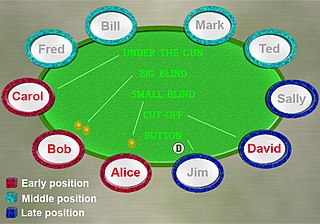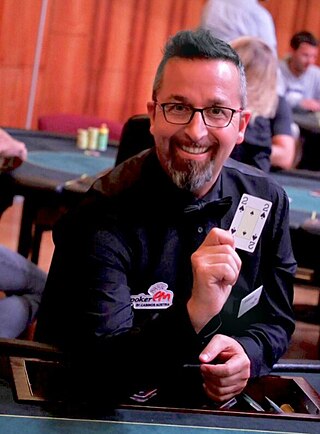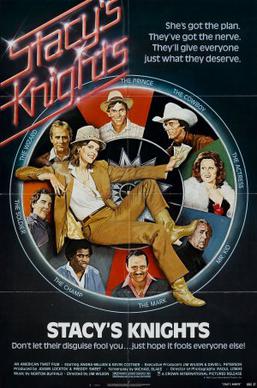Related Research Articles

Blackjack is a casino banking game. It is the most widely played casino banking game in the world. It uses decks of 52 cards and descends from a global family of casino banking games known as "twenty-one". This family of card games also includes the European games vingt-et-un and pontoon, and the Russian game Ochko. The game is a comparing card game where players compete against the dealer, rather than each other.

Craps is a dice game in which players bet on the outcomes of the roll of a pair of dice. Players can wager money against each other or against a bank. Because it requires little equipment, "street craps" can be played in informal settings. While shooting craps, players may use slang terminology to place bets and actions.
Pai gow poker is a version of pai gow that is played with playing cards, instead of traditional pai gow's Chinese dominoes. The game of pai gow poker was created in 1985 in the United States by Sam Torosian, owner of the Bell Card Club.

In the game of poker, the play largely centers on the act of betting, and as such, a protocol has been developed to speed up play, lessen confusion, and increase security while playing. Different games are played using different types of bets, and small variations in etiquette exist between cardrooms, but for the most part the following rules and protocol are observed by the majority of poker players.

A croupier or dealer is someone appointed at a gambling table to assist in the conduct of the game, especially in the distribution of bets and payouts. Croupiers are typically employed by casinos.
Card players are those participating in a card game. Various names are given to card players based on their role or position.
Caribbean stud poker, also called casino stud poker, is a casino table game with rules derived from five-card stud poker. However, unlike standard poker games, Caribbean stud poker is played against the house rather than against other players. There is no option to bluff or deceive as this is played against the house and not other players.

Card counting is a blackjack strategy used to determine whether the player or the dealer has an advantage on the next hand. Card counters try to overcome the casino house edge by keeping a running count of high and low valued cards dealt. They generally bet more when they have an advantage and less when the dealer has an advantage. They also change playing decisions based on the composition of the deck and sometimes play in teams.
Online casinos, also known as virtual casinos or Internet casinos, are online versions of traditional casinos. Online casinos enable gamblers to play and wager on casino games through the Internet. It is a prolific form of online gambling.

Foxwoods Resort Casino is a hotel and casino complex owned and operated by the Mashantucket Pequot Tribal Nation on their reservation located in Ledyard, Connecticut. Including six casinos, the resort covers an area of 9,000,000 sq ft (840,000 m2). The casinos have more than 250 gaming tables for blackjack, craps, roulette, and poker, and have more than 5,500 slot machines. The casinos also have several restaurants, among them a Hard Rock Cafe. It has been developed since changes in state and federal laws in the late 20th century enabled Native American gaming on the sovereign reservations of federally recognized tribes.
MindPlay was a technology designed to monitor blackjack players' actions while playing in a casino, first released in 2003 and discontinued in 2007.

Commerce Casino is a cardroom located in the Los Angeles suburb of Commerce. With over 240 tables on site, Commerce Casino is the largest cardroom in the world. Established in 1983, the casino accounted for 38% of Commerce's tax revenues for the 2006-2007 fiscal year. As of 2016, the casino was providing $22 million a year in licensing fees to the city.

A poker dealer distributes cards to players and manages the action at a poker table.
The table limit is the minimum and maximum bet that a gambler can make at a gaming table. It is a form of yield management in that the limits can be changed to optimize the profit from a gaming table. Gaming tables have a limited resource to sell: the seats used by the players.

A casino pit is an area of a casino which typically contains tables for blackjack, craps, roulette, and other games.

Comps are complimentary items and services given out by casinos to encourage players to gamble. The amount and quality of comps that a player is given usually depends on what games they play, how much they bet and how long they play.

Stacy's Knights is a 1983 American film directed by Jim Wilson.

Casino security refers to the measures that are taken at casinos to protect the establishment's money, property and patrons. The security protects the casino and its customers from violent crime, theft, and other inappropriate behavior.

Carl Cohen, was an American executive in the gambling resort industry in Las Vegas, Nevada, in the 1940s through 1970s and is credited with playing an important role in the development of Las Vegas as a premier resort destination.
Al Francesco was an American blackjack player and gambling strategist. Considered to be “The Godfather of Blackjack”, Francesco is recognized as the creator of the team play concept, the “big player” strategy, and the drop card method. Beginning in 1971, Francesco personally recruited and trained disciplined card counters to work together in teams to beat the casinos. Franceso's teams of blackjack players would station themselves at various blackjack tables to count the decks, and when the mathematical odds turned in their favor, the counters would signal a “Big Player” to come to the table and place large wagers until the edge was lost and once again favored the dealer. While most card counters would eventually be discovered by casinos through their betting patterns and banned from further play, Francesco's unique team concept helped his players evade detection and continue winning.
References
- ↑ Mill, Robert Christie (2008). Resorts Management and Operation. Wiley. p. 429. ISBN 978-0471747222 . Retrieved 2022-10-17.
- ↑ "Casino Pit Boss - What a Pit Boss Does".